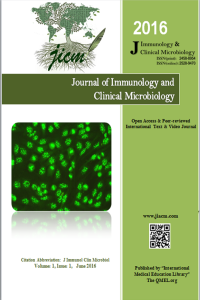Abstract
It has been well-known that several microorganisms that have an effect on particular areas of the body might additionally have systemic sequelae. In the last ten years, various studies have been performed on the relationship between Helicobacter pylori infection and a variety of extra digestive illnesses including immunological, hematological, neurological disorders and different pathologies. It has been recommended that complicated interactions between bacterial and host genetic factors, as well as environmental factors, play considerable roles in determining different clinical outcomes. Although, there are conflicting and controversy data in some diseases, in the light of literature, it is currently accepted; that the presence or absence of H. pylori infection might influence the chance of developing of many autoimmune diseases. Treatment of H. pylori infection has been reported to be effective in some diseases like Schoenlein-Henoch purpura, ITP, psoriasis and chronic autoimmune urticaria. This review focuses the possible role of H. pylori infections in various autoimmune diseases taking into account the recent literature.
References
- Yula E, Nagiyev T, Kaya OA, Inci M, Celik MM, Köksal F. Detection of primary clarithromycin resistance of Helicobacter pylori and association between cagA (+) status and clinical outcome. Folia Microbiol 2013; 58: 141-146
- Nagiyev T, Yula E, Abayli B, Koksal F. Prevalence and genotypes of Helicobacter pylori in gastric biopsy specimens from patients with gastroduodenal pathologies in the Cukurova Region of Turkey. J Clin Microbiol 2009; 47: 4150-4153.
- Nagiyev T, Köksal F, Abaylı B, Yula E. [Comparison of culture and GlmM-PCR Methods for detecting Helicobacter pylori in antral and corpus biopsy specimens in patients with gastroduodenal disorders]. Turkiye Klinikleri J Med Sci 2010; 30: 919-924.
- Yula E, Nağiyev T, Köksal F, [Comparation of two different primer sets used for detection Helicobacter pylori DNA by polymerase chain reaction assay in gastric tissues], Turkiye Klinikleri J Med Sci 2010; 30: 1166-1170.
- Moodley Y, Linz B, Yamaoka Y, Windsor HM, Breurec S, Wu JY, Maady A, et al. The peopling of the Pacific from a bacterial perspective. Science 2009, 323: 527-530.
- Miernyk K, Morris J, Bruden D, McMahon B, Hurlburt D, Sacco F, et al. Characterization of Helicobacter pylori cagA and vacA genotypes among Alaskans and their correlation with clinical disease. J Clin Microbiol 2011; 49: 3114-3121.
- Hernando-Harder AC, Booken N, Goerdt S, Singer MV, Harder H. Helicobacter pylori infection and dermatology diseases. Eur J Dermatol 2009; 19: 431-444.
Abstract
References
- Yula E, Nagiyev T, Kaya OA, Inci M, Celik MM, Köksal F. Detection of primary clarithromycin resistance of Helicobacter pylori and association between cagA (+) status and clinical outcome. Folia Microbiol 2013; 58: 141-146
- Nagiyev T, Yula E, Abayli B, Koksal F. Prevalence and genotypes of Helicobacter pylori in gastric biopsy specimens from patients with gastroduodenal pathologies in the Cukurova Region of Turkey. J Clin Microbiol 2009; 47: 4150-4153.
- Nagiyev T, Köksal F, Abaylı B, Yula E. [Comparison of culture and GlmM-PCR Methods for detecting Helicobacter pylori in antral and corpus biopsy specimens in patients with gastroduodenal disorders]. Turkiye Klinikleri J Med Sci 2010; 30: 919-924.
- Yula E, Nağiyev T, Köksal F, [Comparation of two different primer sets used for detection Helicobacter pylori DNA by polymerase chain reaction assay in gastric tissues], Turkiye Klinikleri J Med Sci 2010; 30: 1166-1170.
- Moodley Y, Linz B, Yamaoka Y, Windsor HM, Breurec S, Wu JY, Maady A, et al. The peopling of the Pacific from a bacterial perspective. Science 2009, 323: 527-530.
- Miernyk K, Morris J, Bruden D, McMahon B, Hurlburt D, Sacco F, et al. Characterization of Helicobacter pylori cagA and vacA genotypes among Alaskans and their correlation with clinical disease. J Clin Microbiol 2011; 49: 3114-3121.
- Hernando-Harder AC, Booken N, Goerdt S, Singer MV, Harder H. Helicobacter pylori infection and dermatology diseases. Eur J Dermatol 2009; 19: 431-444.
Details
| Primary Language | English |
|---|---|
| Subjects | Clinical Sciences |
| Journal Section | Review Article |
| Authors | |
| Publication Date | June 30, 2016 |
| Published in Issue | Year 2016 Volume: 1 Issue: 1 |
Cite
Cited By

Creative Commons Attribution Non-Commercial License: The articles in the Journal of Immunology and Clinical Microbiology are open access articles licensed under the terms of the Creative Commons Attribution Non-Commercial License (http://creativecommons.org/licenses/by-sa/4.0/) which permits unrestricted, non-commercial use, distribution and reproduction in any medium, provided the work is properly cited.

